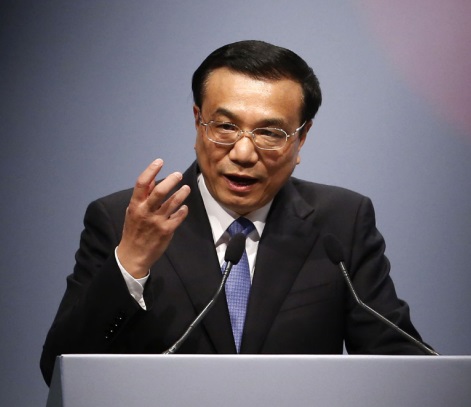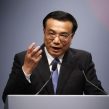
What to Ask at the Third Plenum: Is Xi’s Party Building Sufficient for Reform?
Publication: China Brief Volume: 13 Issue: 16
By:

On July 30, Xi Jinping oversaw a meeting of the Politburo to discuss economic reform, ahead of the widely-anticipated discussions at Beidaihe leading up to the release of a new economic reform package at the Third Plenum in October (Xinhua, July 30). The official press provides no further detail about the meeting, but Premier Li Keqiang has described the center’s economic priorities at great length in recent months. Meanwhile, Xi has been busy consolidating power, gaining hold of what appears to be an unusually strong grasp of the party’s central apparatus. It remains unclear, however, what these programs have to do with one another—how Xi and Li plan to enact wide-reaching changes beyond central control. As economic reform plans emerge in the coming months, this will be the critical question to ask.
Li has spoken extensively about economic reform since taking office, and his speeches and documents issued by the State Council have placed a wide range of ambitious goals on the agenda. His definite priorities include urbanization, tackling the enormous debts of local governments and, more vaguely, “returning to the market whatever can best be handled by the market”—a clear response to the Hu Jintao-era trend known as “the state sector advancing while the private sector retreats” (guojin mintui) (Xinhua, July 30; China Daily, May 15; China News Service, May 15; Xinhua, March 17). Likewise, Xi has spoken extensively about cracking down on corruption. Less clear, but announced by the State Council, are efforts to reform the household registration system and rural land transfers (Xinhua May 24; April 3).
The success of these reforms will hinge on the ability of the Chinese Communist Party (CCP) and government to oversee their provincial and local branches—a challenge in any large organization and an especially severe weakness of the Chinese state. These policies will be implemented largely on a local level, and they will impact the finances of local governments as well as, in the case of anti-corruption, the personal finances of local officials.
So far, Xi’s political activities have focused on the internal management of the party and its bureaucracy. His “mass line” speeches have deployed Maoist language in the service of a Hu-ist campaign to improve the professionalism and oversight of cadres. As Timothy Heath writes in this issue of China Brief, the mass line campaign closely tracks the concerns of Hu’s early “maintain the advanced nature of CCP members” push, using the methods of a rectification campaign to develop the CCP as a professional institution with strong internal regulations (“Xi’s Mass Line Campaign: Realigning Party Politics to New Realities,” China Brief, August 9). Hu’s campaign against corruption and for more moral cadre did not accomplish much. If anything, party leaders’ warnings about the issue have become more frequent and more urgent in recent years. Hu returned to the same themes in his outgoing report to the 18th Party Congress (Xinhua, November 17, 2012).
This kind of central power has proved effective for winning ideological debates and kneecapping political opponents, most dramtically Chen Liangyu and Bo Xilai, but not much good for providing oversight to a political party of 80 million (“The Soapbox and the Truncheon: Hu Jintao’s Amorphous Power,” China Brief, July 19, 2012). This forces us to ask how the current administration plans to achieve its goals. If it is taking on challenges that defeated Hu Jintao, what are they doing differently or what position does Xi have that can lead to a different result?
Xi comes into office with several advantages over his predecessor that are obvious, but still warrant mention. First, he has a smaller and more unified Politburo Standing Committee, including seven rather than nine members. Those Chinese officials pegged as reformers or of Hu Jintao’s China Youth League Faction (tuanpai) were confined to the Politburo, even the well-credentialed Li Yuanchao who headed the Organization Department. Xi’s colleagues are more likely to believe in a strong state with centralized authority (“China’s New Leaders to Strengthen the Party-State,” China Brief, November 30, 2012). Second, Xi does not seem to have the same “party elders” problem that Hu faced, because of Jiang Zemin’s continuing service on the Central Military Commission and the presence of his protégés, like Zeng Qinghong, in important positions on the Standing Committee.
In addition to his control over the political apparatus, Xi seems to have succeeded in ensuring the loyalty of the military and security apparatus. Most noticeably, Xi has incorporated the PLA into his major political campaigns, including the “China Dream,” mass line activities and anti-corruption (South China Morning Post, August 5; People’s Daily, July 31; PLA Daily, July 30, March 5; March 4). He also has promoted a large number of generals, including six just before this year’s Army Day (Xinhua, August 1; South China Morning Post, July 31). Moreover, Xi reportedly has taken direct control over the civilian security apparatus, which is overseen by the Central Political-Legal Commission, and appears to have made political plans to ensure his control. With Meng Jianzhu as executor, Xi ostensibly directs the paramilitary People’s Armed Police, the Ministry of Public Security and the Ministry of State Security, giving him control over internal security and domestic intelligence (“Appraising Xi Jinping’s Politicking,” China Brief, July 12; South China Morning Post, July 3; Ming Pao, January 30).
Assessing how power gets exercised in the Chinese system is a speculative exercise; however, Xi’s political power seems focused on mechanisms that facilitate central decisions and central policy execution, such as national security policymaking. Xi may be able to outmaneuver, persuade or coerce the Politburo into taking his direction, but the 83 million party members and the party bureaucracy are a different matter entirely. The problems facing this Chinese president, if anything, are more daunting than when Hu held office and Xi will be judged on how he pushes the ambitious agenda outlined above. President Xi, however, still faces the difficulty that Hu did in exercising power between the soapbox and the truncheon. The former gives him a far-reaching, but potentially ineffectual, voice. The latter gives him potent but narrowly-focused coercion, and Xi cannot kneecap all of his opponents—particularly not every recalcitrant party member. The question for Xi Jinping, indeed of Chinese politics writ large, is how well can any leader make substantial changes to the system without becoming, in Xi’s words, “China’s Gorbachev.”





